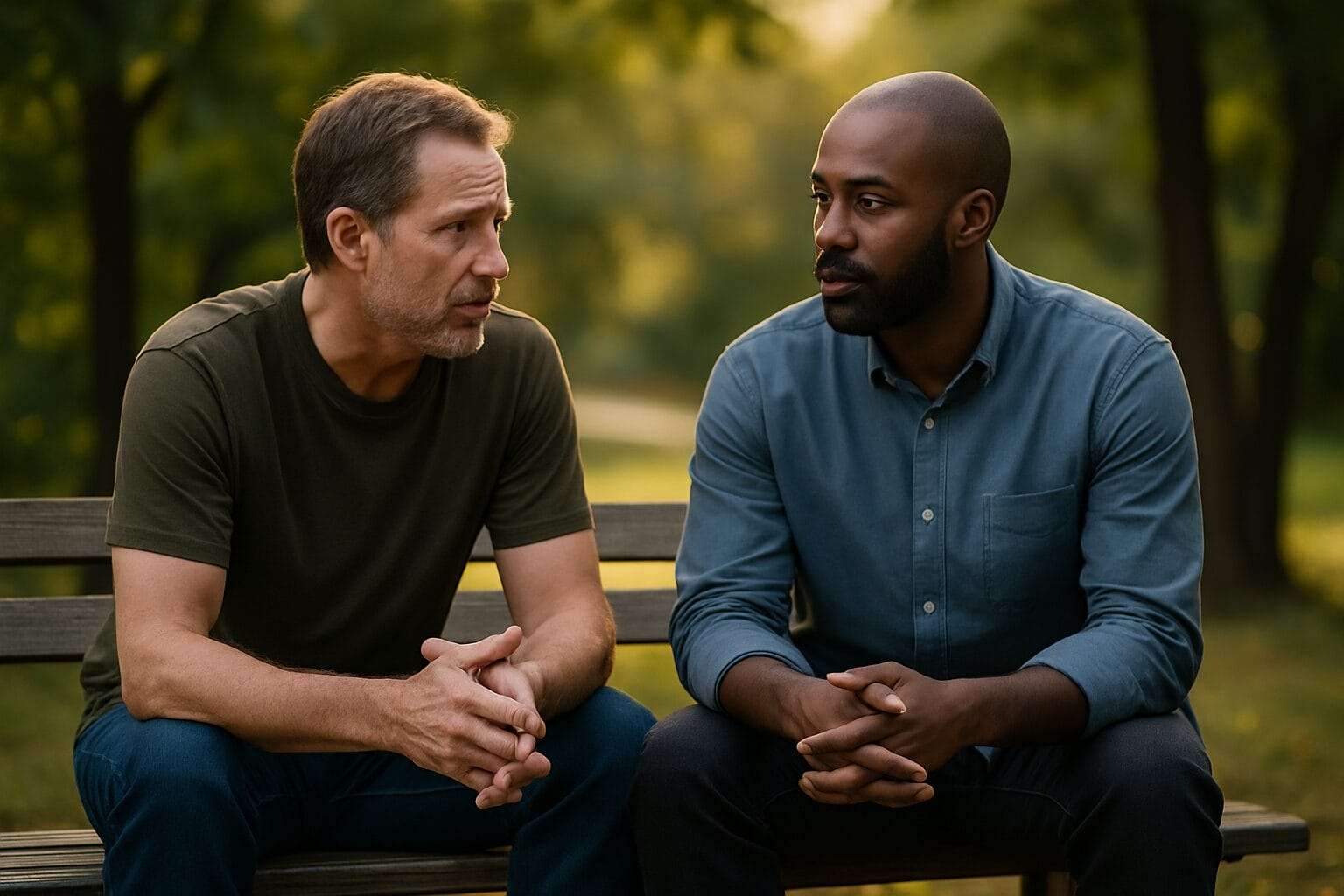Everyone listens when Marcus talks.
He’s the calm one. The clear thinker.
The guy you go to when your launch is failing, your marriage is on the rocks, or your mind’s about to break.
In every room—he’s respected.
But lately, Marcus can’t sleep.
He stares at the ceiling wondering how he became everyone’s rock—but no one’s safe place.
He shows up to the mastermind, makes the jokes, gives the advice…
but inside, he’s checked out.
He doesn’t talk about the panic attack last week.
Or how empty sex feels.
Or the rage that flashes when no one’s around.
Because deep down, Marcus knows:
This isn’t real brotherhood.
This is a performance—dressed up as connection.
And I wonder… is that you?
Are you the one who gets the nods, the referrals, the praise—
but never the pause to ask how you’re doing?
Do you shrink a little more each time you show up?
Not because you’re weak… but because the room only knows the version of you that’s useful?
If so—this isn’t your failure.
It’s a system problem.
And you’re not the only one trying to survive it.
🎭 It’s Brotherhood—Until You Start to Grow
Toxic brotherhood doesn’t always show up as cruelty or control.
Sometimes it looks like loyalty, inside jokes, and “we’ve got your back.”
But underneath, there’s a pattern.
And once you see it, you can’t unsee it.
Let’s name what it actually feels like:

🧱 1. No Space for Emotional Truth
You mention the panic attack you had last week, and the room goes quiet.
Someone changes the subject. Another guy gives a half-smile and nods like you said something awkward.
Message received: That was too much.
🥇 2. Competitive Undertones
You’re celebrating a personal win—something small but meaningful—and someone jumps in with,
“That’s cool, man. I just hit 40K on that launch, too.”
You weren’t trying to compete. But now it feels like you lost.
🤡 3. Mockery of Growth or Therapy
You mention your coach. Or that you’re reading a book on emotional health.
Someone cracks a joke: “Getting soft on us?”
It sounds playful. But you feel the shrink happening inside your chest.
🧍🏾 4. Enforced Masculine Rules
You’re expected to be calm, confident, non-reactive.
Need something? Don’t.
Feel something? Fix it quietly.
Struggle? That’s on you.
And if you do break one of the rules, it’s not punishment—it’s disconnection.
🤐 5. Unspoken Contracts
No one says it out loud.
But you know the terms:
Don’t cry.
Don’t need too much.
Don’t change too fast.
Don’t be the first one to go deep.
And if you do? You risk exile—not overtly, but emotionally.
You become that guy. The one no one knows how to be around.
This is the pattern.
It doesn’t always start toxic.
But over time, it leaves men emotionally starved—surrounded by people, but completely unseen.
🔎Check In
You ever share a piece of your truth and feel the temperature drop?
That’s not safety. That’s emotional surveillance.
🧠 The 5 Brotherhoods That Break You (Even While You’re Winning)
Not all toxic brotherhoods look the same.
Some dress like ambition.
Some speak in Scripture.
Some laugh off the pain.
Some quote stoicism.
But they all have one thing in common:
They train you to perform connection instead of experience it.
These groups aren’t always malicious.
Some even started as lifelines.
But when a brotherhood only welcomes part of you—it eventually costs all of you.
Let’s name them.

💼 1. The Hustle Bros
Status = revenue. Connection = performance.
This group pushes hard, celebrates wins, and treats rest like weakness.
If you slow down, they disappear.
If you struggle, they talk metrics.
You’re welcome here—as long as you stay useful.

🏋🏾 2. The Gym Pack
Emotions get rep’d out or joked away.
You can talk soreness, gains, diet plans—but not grief.
Vulnerability gets side-eyed or dismissed as “drama.”
Strength is measured in weight—not in self-awareness.

🙏🏽 3. The Church Brotherhood
God is present. But emotions are often policed.
You can confess sin—but not sadness.
You can repent—but not rage.
The goal is spiritual strength—sometimes at the cost of emotional honesty.
There’s grace for your flaws, but not always space for your fears.

🎮 4. The Escape Crew
This group bonds through distraction: poker, fantasy football, gaming.
It’s not inherently harmful—but it becomes a trap when it’s the only safe place.
You’re together, but nothing real gets said.
Emotional proximity is replaced with digital loyalty.

📚 5. The Intellectual Ego Club
This is the group that debates emotion but never feels it.
You can talk trauma theory, masculinity, emotional labor—
but God forbid you actually cry in front of them.
The mind is welcome. The body? The heart? Not so much.
📊 Stat: The Silent Pressure on Men
These groups aren’t always malicious.
Some even started as lifelines.
But when a brotherhood only welcomes part of you—it eventually costs all of you.
And this isn’t rare.
A recent OnePoll survey found that:
50% of men feel pressured to “act manly”
62% say certain topics are completely off-limits—especially emotional pain (50%), mental health (39%), and even intimacy struggles (45%)
And as a result? More than half say their friendships lack depth.
So if you’ve been sensing something’s off in your circle—you’re not crazy.
You’re just waking up to a system that trains men to be present, but never seen.
🔄 The Real Cost—To Him, To You, To Everyone
This is where the cracks start showing.
He doesn’t know how to rest.
He can’t name what he’s feeling.
His body is tense, his jaw clenched, his laughter slightly off-key.
His partner feels the distance. His kids feel the unpredictability.
And still—he won’t call it emotional pain.

Because he’s been taught that men don’t say “I’m overwhelmed.”
They say “I’ve got it.”
But what’s really happening? This is how Jason Wilson describes it:
Suppressing your emotions is like holding ping-pong balls underwater.
You can only keep them down for so long before one pops up.
Men… suppressing your emotions is like holding Ping-Pong balls under water. You can only hold them down for so long before one pops up unexpectedly—and often uncontrollably. Trust me, you do not have to suffer in silence anymore. You too can escape from emotional incarceration! pic.twitter.com/wVNzpERsfb
— Jason Wilson (@mrjasonowilson) January 12, 2023
That “pop” looks different for every man:
Rage at the wrong person.
Numbness in a relationship.
Secret addiction. Compulsive behavior. Emotional shutdown. He’s functioning.
But he’s emotionally flooding—and no one around him knows how to throw a rope, because they all learned to swim in denial too.
He’s not a failure.
He’s not broken.
He’s just been trained to survive in a system that rewards masks—and penalizes truth.
And the people who love him feel it—even if they can’t name it.
🗣 Mini-Voices from His World:
“I don’t even know who he is anymore.”
—His partner
“He’s there—but not really there, you know?”
—His son
“He gets the job done, but I’ve never seen him crack. That’s not normal.”
—His colleague
“We talk every week. But I don’t think I’ve ever heard how he’s actually doing.”
—His closest friend
That’s the cost.
Not just to him.
To everyone who wants to love him—but keeps bumping into the mask.
🛖You Don’t Have to Burn It All Down—But You Can Stop Shrinking
Healing doesn’t mean disappearing.
You don’t have to ghost your group, move to the outback, or cut everyone off.
But you do have to stop gaslighting yourself.
Because if a space only welcomes your competence—not your humanness—
that’s not brotherhood.
That’s emotional exile with a friendly tone.
So what does healthy brotherhood actually look like?

🌱 A New (Old) Model of Belonging:
✅ You don’t have to perform to stay included.
✅ You can say “I’m not okay” without derailing the vibe.
✅ You can pause. Feel. Name. Shift.
✅ You can share something real—and not be met with silence, sarcasm, or shallow advice.
✅ You can grow—without being accused of changing.
👣 Where to Start (Without Burning Down Your Life):
Be honest with yourself first.
If the room no longer feels safe, admit it. You don’t have to prove anything to anyone anymore.Test depth—quietly.
Bring a real truth into the room and see what happens.
Not to shock. Just to see who’s still listening.Invest in 1:1 connection.
Sometimes the group can’t go there—but one man in it might be ready. Start there.Find or create spaces that match your growth.
Therapy. Men’s groups. Coaching. Silent friends who can hold depth without fixing it.
These aren’t soft spaces—they’re sacred ones.
You don’t have to change your name and move to the outback.
But you do have to stop pretending you’re thriving when you’re starving for real connection.
The rebuild isn’t loud.
It’s honest.
And it starts the moment you stop trying to shrink your soul to stay in the room.
❓ FAQ: “So What Now?”

Q: Does this mean I can’t have guy friends anymore?
No. But it does mean you stop tolerating dynamics that drain you just because they’re familiar. Brotherhood is meant to build you—not box you in.
Q: What if I bring my real self and they pull away?
Then you just got your answer.
Let them.
You’re not losing friends—you’re losing a performance contract you never agreed to sign in the first place.
Q: Why does this feel so lonely?
Because you’re detoxing from a version of belonging that required your silence.
But loneliness isn’t failure.
It’s proof that your standards are rising.
And yes—you can hold the line without collapsing.
📚 Want more support while you walk through it?
These posts can help:
You’re Not Broken—You’re High-Functioning and Hurt
For the man who’s showing up on the outside—but unraveling underneath.Emotional Intimacy Isn’t Just Sex or Oversharing—It’s a Learnable Skill
What closeness actually looks like—and how to build it without oversharing or losing your edge.How Radical Honesty Helps You Overcome Fear & Build Strength
For when you’re done performing and ready to speak what’s real—even if your voice shakes.
🧭 Create Brotherhood On Your Safety. Not Fear or Insecurity.
This isn’t about canceling your crew or cutting off every guy who’s ever made a joke at your expense.
It’s about recognizing when the cost of staying loyal to a room…
is the slow disappearance of your soul.
You don’t need to start over.
You just need to stop shrinking.
And if that feels lonely—you’re not the only one walking this road.
You’re just one of the few brave enough to admit it.
💌 Want to stay connected while you figure this out?
I write for men (and the people who love them) who are doing the hard, invisible work of emotional growth—without making it a performance.
If you’re looking for real talk, grounded insight, and weekly reminders that you’re not alone:
👉 Join the list – no fluff, just honest support for your next season.
(You can unsubscribe the minute it stops serving you. No hard feelings.)



